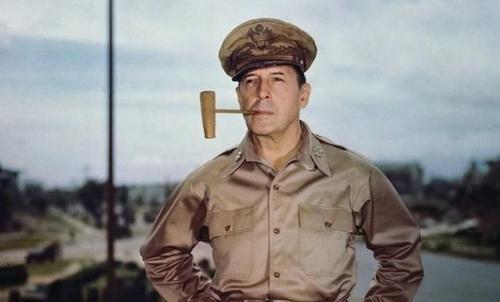What did MacArthur, who had lost the war, go through when he returned home?
In the early morning hours of April 11, 1951, President Truman held a press conference and abruptly announced the decision to dismiss MacArthur from all office. Overnight, a five-star officer with four commander-in-chief titles would be relieved of all duties, a rarity in American history. Why was MacArthur suddenly ousted?

Douglas MacArthur was one of the famous five-star generals in the United States, born on January 26, 1880 in a military camp in Little Rock, Arkansas, in the southern United States, and his unique talent and unusual tutor developed his brave, strong, confident, and proud character.
He fought in the First and Second World Wars, and his outstanding performance in the Great War brought him to the top:
He became the youngest principal of the West Point Military Academy in 1919; the youngest major general in 1925; the youngest chief of staff of the Army in 1930; he was awarded the Order of Honor of Congress in March 1942; he was promoted to five-star general in December 1944; he was appointed Supreme Commander of the Allied Forces in August 1945... His life is full of legends.
The U.S. government and the public believe that his past legend is bleak compared to the legendary experience he created in the Korean War at the age of 70.
It is true that MacArthur was a hero of the United States for his miracles in the Korean War, but it was precisely because of repeated mistakes in the Korean War that ruined his military career.
In 1950, MacArthur became "Commander-in-Chief of the United Nations Army", commanding the invasion of Korea. At the Inchon Landings, he temporarily reversed the initial defeat of the American Army, cutting the Korean People's Army in two, and then he drove straight into the Yalu River.
A series of offensive and adventurous victories made the general dizzy and inflated his "self"; he thought that he was invincible in the whole world, and he even sent troops to bomb our northeastern cities and shell our merchant ships at sea, directly threatening the security of our country.
The Chinese government repeatedly warned, but MacArthur was blind and could not stand still, believing that the Chinese people did not dare or be able to enter the war. Arrogant ambassador, he completely disregarded the indomitable dignity of the Chinese and Korean peoples and the great potential to fight aggression.
On March 23, 1951, MacArthur issued an ultimatum to the Chinese army, demanding that the Chinese volunteers surrender unconditionally. The move annoyed Truman, who saw his actions as a provocation to the president's authority and feared that it would spark World War III, ordered MacArthur's removal from four positions.
Surprisingly, MacArthur was greeted with a tsunami upon his return home, and at the subsequent hearings, he cleverly defended himself by slyly stopping mentioning the burning of war or the dropping of atomic bombs at China.
He whitewashed himself as Li Yunlong of the United States and portrayed Truman as the capitulationist Song Jiang, which detonated the heroism of the silly people, and the 34-minute speech was interrupted by 30 applause.
At that time, 30 million Americans watched live television, factories shut down, schools shut down for everyone to watch, and countless people listened to the radio.
Despite MacArthur's spitting out lotus flowers and falling from the sky, Truman didn't watch TV at all, ate lunch, took a nap, and flipped through MacArthur's speeches, which were said to be: A bunch of. ”
The day of the US election has arrived.
In 1952, Republican Taft was the leading contender for the Republican nomination. But liberals in the Republican Party believed that Taft could not win, so they chose Eisenhower, who was nato's commander-in-chief at the time.
Eisenhower was humble, generous, and upright, not as proud as MacArthur, and Eisenhower was respected and loved by all strata, and even Democrats could accept him.
On July 7, 1952, MacArthur was invited to give an important speech at the Republican Convention. When he walked into the hall, he was greeted with an astonishingly warm cheer and a warm welcome. Like the 1944 election, he had another chance of breaking the scoring.
However, this opportunity was soon lost. His speech was flashy, tedious, lengthy and full of clichés, as if the weather in July was so hot that it was almost suffocating.
It's hard to imagine that a year ago, the penetrating, charismatic speeches of his "Veterans Don't Die" speech no longer exist. His speech was drowned out by a cacophony of noise, no one cared about his clichés, some spectators hurried away, and there was unprecedented chaos in the venue.
After that, a heavy-hearted MacArthur quietly left the venue and returned to New York, holding out a glimmer of hope and waiting for the results of the general assembly vote.
But in the first round of voting on July 11, Eisenhower received more than six hundred votes, Taft more than five hundred votes, and MacArthur received only a dozen votes. In this way, MacArthur's dream became a bubble again. As Roosevelt said, "He was a great military man, but he was a turtle-footed politician." ”
On April 5, 1964, MacArthur, a general who combined arrogance and bravery, died. His body was placed in Washington, New York, and Norfolk for hanging.